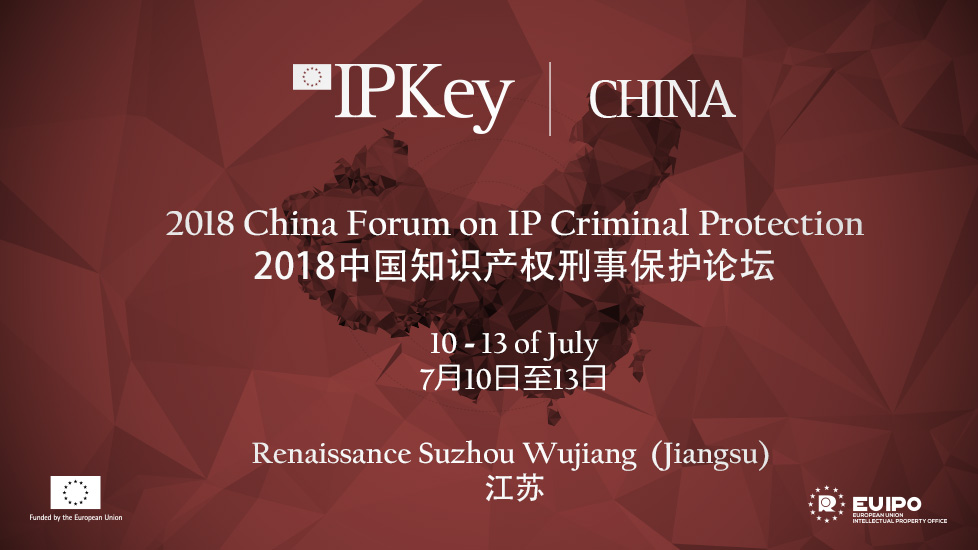2018 China Forum on IP Criminal Protection
IP Key China and the Quality Brands Protection Committee (QBPC) partnered in the organisation of the "2018 China Forum on IP Criminal Protection", that took place out of Renaissance Suzhou Wujiang (Jiangsu) on July 10-13.
The Forum gathered together 350 participants from Chinese and foreign Law Enforcement bodies, Prosecutor offices, Customs, IP Courts, e-commerce platforms, IP Right holders and law professionals, as well as Embassy representatives, WIPO and INTERPOL.
The event, hosted annually by QBPC and, this year for the first time in collaboration with IP Key China, focused on international knowledge sharing on IP criminal prosecution, including e-commerce and internet piracy, cross-border investigations, fight to transnational organised crime, new trends and Tools to support IPR owners and enforcement authorities.
The European Observatory on Infringements of Intellectual Property Rights was invited to coordinate with IP Key the session “China-EU Collaboration on IP Law Enforcement” that showcased contributions from Spanish Police, Italian National Customs, National Prosecutor Office of the Netherlands, EUROPOL as well as a panel discussions with China’s law enforcement authorities from the Economic Crime Division of the Ministry of Public Security, General Customs and IP Procuratorates.
Discussions held during the event highlighted several recurrent issues and helped shed more light on some of the underlying challenges faced by IPR owners, as well as concerns in IP criminal enforcement actions in China, providing several learning points from international cooperation on enforcement, in particular:
- China’s police authorities have reportedly intensified pressure on complex counterfeiting networks, which control the production and distribution of tobacco and other fake products, that has reshaped the way organized criminal networks operate. Further police cooperation between the EU and China is needed to make additional progress on tackling these criminal behaviours.
- In future, discussion of specific counterfeit trade routes, such as Hong Kong, Singapore or the China-Europe (BRI) rail road, would reflect comments made during the event: law resources and capacities against small consignments, need to develop international cooperation between the EU, China, Russia and Central Asia, particularly on the monitoring of railway traffic.
- Value-based criminal thresholds are still perceived as a system often difficult to navigate for IPR owners and enforcement authorities alike.
- The evolving big data capabilities of law enforcement agencies has led to greater effective use of these techniques, although IP protection and enforcement has received comparatively less attention than other areas of criminal activity.
- Big data can help identify patterns but for those patterns to support cross border criminal prosecution of IPR infringement, big data should be shared on a global basis overcoming national protectionism over information and lack of trust.
- In online investigations, the deep and dark web now receive a sizeable level of attention from enforcement authorities in Europe. The commercial value of and trade of data has exponentially increased, enabling new forms of illicit trade. Anonymous communication is one of many tools available in the deep or dark web, and these methods of achieving anonymity have become both more sophisticated and more accessible to internet users.
- Public policy and government cooperation should provide further support to investigators, in particular with regards to interception of packages delivered by express couriers, exploitation of weaknesses in websites and browsers that could help reveal infringers’ identity, cooperation with IPR owners who could help verify digital evidence as witnesses.
- On the liability of e-commerce platforms, concerns have been raised by multiple parties on the current formulation of the e-commerce law, in as far as counterstatements of no-infringement by operators, could lead to revoking measures applied to block infringing contents, thus potentially jeopardizing also follow up criminal enforcement actions by right owners.
- With regards to voluntary cooperation among internet intermediaries, public policy should reinforce and promote joint research and cross-industry alliances, encouraging more advanced operators to lead by example smaller platforms and social media’s work towards developing modern IP policies.
- Analysis conducted by EUROPOL and EUIPO shows increasing level of organised crime involved in China-EU trafficking of counterfeits. Fight to transnational organized crime infringing on IPRs requires an array of inter-discipline and cross-IP expertise in law enforcement profession encompassing fraud, tax evasion, money laundering, asset recovery and cybercrime.
For additional information contact info@ipkey.eu.
Video of the 2018 China Forum on IP Criminal Protection
For more information:
- Agenda 2018 China Forum on Criminal IP Protection [PDF - 143KB] [CN]
- Agenda 2018 China Forum on Criminal IP Protection [PDF - 186KB] [EN]
- International Cooperation on IPR Enforcement - Massimo Antonelli [PDF - 3.1MB] [EN,CN]
- Online Investigations and Prosecutions - Erling Vestergaard [PDF - 5.3MB] [EN,CN]
- Trends On Counterfeit Goods - Massimo Antonelli [PDF - 2MB] [EN,CN]
